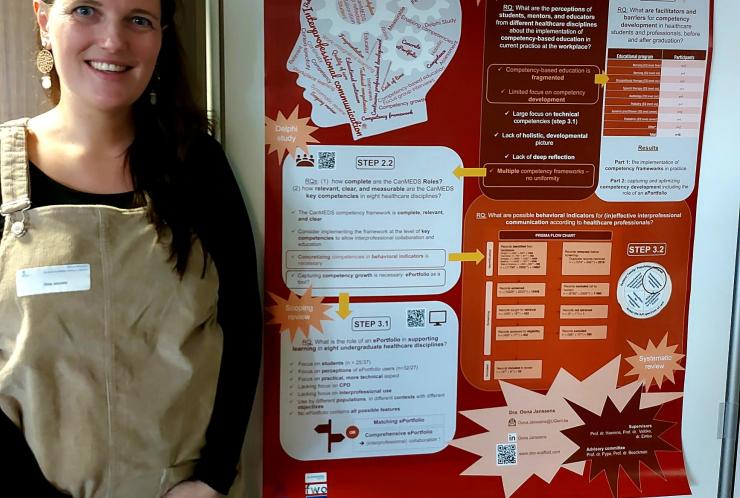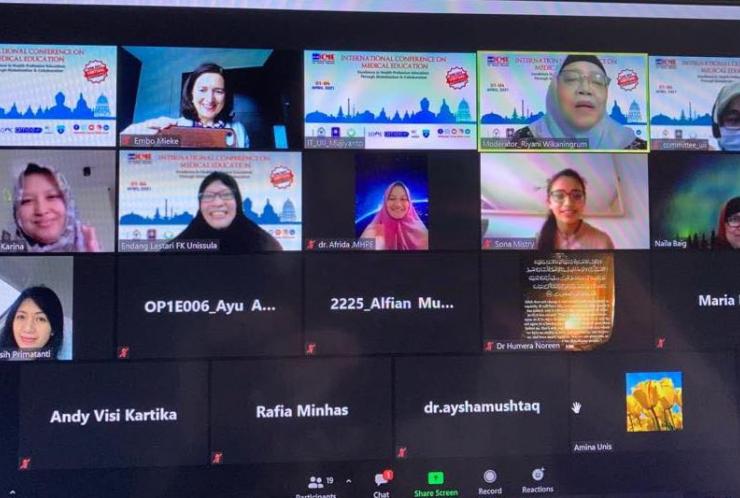This knowledge will be further used to validate the developed ePortfolio proof-of-concepts (from work package 1) in the aforementioned eight healthcare courses. The continuous competence growth throughout the training, at the bridge between training levels but also after graduation, will be central. This ensures that the focus of work package 6 starts from three perspectives:
- Educational level (HBO5 - bachelor - master)
- Domestic and foreign internships
- Before and after graduation
The intended result is optimal mapping of competence growth in the newly developed state-of-the-art ePortfolio.
Cooperation through subcontracting: Mw. Marijke Verfaillie en Mw. Frances Martens, IVV Sint-Vincentius Ghent
Finished studies
-
When theory beats practice: the implementation of competency-based education at healthcare workplaces
Aim: The focus group interviews that took place for work package 1 also provided interesting findings for work package 6. The aim of this study is to explore the perspectives of students, mentors and placement supervisors towards the implementation of competency-based education. These perspectives will be evaluated against the different steps of a scientifically based model for supporting workplace learning within healthcare and reveal the pain points within workplace learning.
Results: An overview of the predefined competences was difficult to find. This complicates the implementation of competence-based education and creates a lack of continuity during workplace learning e.g. the link between selecting relevant competences and formulating learning objectives based on these predefined competences was missing. On top of that, in-depth analysis revealed seven barriers that may hinder effective implementation of competence-based healthcare education:
- A 'gap' between training and the workplace
- A missing overview of predefined competences
- A heavy focus on technical competences at the expense of generic competences
- A weak formulation of learning objectives
- Reflection-related obstacles
- Low feedback quality
- Perceived subjectivity in evaluations.
The results of this study will be published in an academic journal.
-
State-of-the-art scoping review into the use of online portfolios in 8 healthcare courses
Aim: To identify the role of ePortfolio within general health care.
Results: There is a lot of literature regarding the technological side of the ePortfolio. The content aspect is underexposed. As a result, the focus on competence development is limited. The role of an ePortfolio in lifelong learning has also been little researched. Due to the multitude of ePortfolios in use and each having its own objectives, features, context, etc. Is it important to choose an appropriate ePortfolio for a particular target audience, in a particular context, with a particular aim and with the necessary features.
What is important when you want to use an ePortfolio?
- Determine well the ePortfolio's aim before starting with a design and choice platform.
- Look at the context in which the ePortfolio will be used and what features are needed for this.
What is important for future ePortfolio-related research? More research needs to be done on the impact of ePortfolios. Tips:
- Don't limit yourself to perception studies
- Include all users in your research, not just students
- Include all contexts (school/workplace/hospital/independent practices/ residential care centres/etc.) in your research and do not limit yourself to the hospital only
- Include all disciplines in your study so that the effect of ePortfolio on interprofessional collaboration is captured.
The results of this scoping review were published in Nurse Education in Practice. The full article "The role of ePortfolios in supporting learning in eight healthcare disciplines: A scoping review" can be read here:
-
Delphi study to validate the CanMEDs competency framework in undergraduate healthcare courses
Aim: Because it is important to have a clear, workable and generic competency framework at hand, a Delphi study was set up to validate the CanMEDS competency framework within 8 healthcare educational programmes.
Results: The CanMEDS competency framework is a workable framework in the healthcare educational programmes studied. Through a Delphi study, all roles and core competences were validated for relevance and clarity. Two competences were not validated for measurability before graduation:
- The healthcare provider manages career planning, finances and human resources in practice management (role of leader)
- The healthcare provider demonstrates commitment to society by recognising, as well as responding to, societal expectations in healthcare (role of professional).
Following recommendations can be made based on the past study:
- Consider implementing the CanMEDS competency framework at the level of core competencies to increase similarity between different educational programmes and institutions. This provides opportunities to optimise interprofessional collaboration.
- To include the context-specificity of each training, it may be necessary to add more concrete and measurable behavioural indicators to the framework.
- Consider capturing growth throughout training as competences continue to develop throughout the career.
- Consider including different educational levels (from HBO5 to master).
The results of the Delphi study "An online Delphi study to investigate the completeness of the CanMEDS Roles and the relevance, formulation, and measurability of their key competencies within eight healthcare disciplines in Flanders" were published in BMC Medical Education. You can read the full article here:
Ongoing studies
-
The identification of (in)effective interprofessional communication behaviour in healthcare: a systematic qualitative meta-aggregation review to develop behavioural indicators assessing interprofessional communication
Aim: The identification of (in)effective interprofessional communication to develop behavioural indicators assessing interprofessional communication.
A systematic review will be conducted to identify possible behavioural indicators. (This paper is in progress).
-
Identifying facilitators and barriers for competency development in healthcare education
Aim: Previous research shows a strong focus on the competences to be achieved in healthcare education. In doing so, competences are often not seen as a coherent whole. More so, competence growth is underemphasised due to the lack of continuity throughout training. This study focuses on facilitators and barriers to competence development in healthcare training.
Fourteen semi-structured interviews were conducted with 16 participants to identify the current integration of competence development. A qualitative thematic analysis was used to identify codes, themes and concepts. (This paper is in progress).
Presentations
INTED conference, March 2021 and ICME conference, April 2021
Oona presented two of her studies: a state-of-the-art review on ePortfolios in healthcare and a Delphi study validating the well-known CanMEDS competency framework in general healthcare training. You can read the abstracts here:
Care4 conference, February 2022
Oona presented her study "No continuity in continuous workplace learning? Perspectives on a learning, assessment and supervision model in undergraduate healthcare education." at the Care4 conference. You can download the abstract and her poster below:
AERA (American Educational Research Association) conference, April 2022
Sofie, Clara, Oona, Marieke and Mieke presented the Scaffold project at the annual AERA conference. Our researchers explained various aspects of the Scaffold project. Oona explained the benefits, challenges and recommendations on ePortfolio use in healthcare. You can read the abstract below:
NVMO conference, May 2023
In a roundtable session, we presented the Scaffold project and discussed the challenges of collaborating with different disciplines and the future of ePortfolio. You can read the abstract below:











